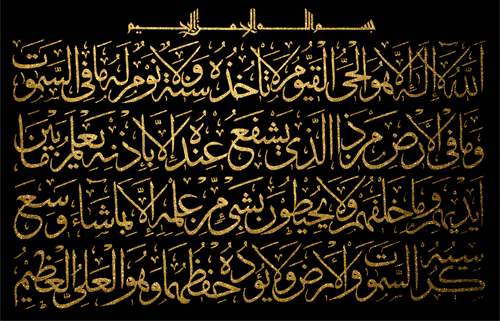

Here’s the fourth sentence ― man dhā lladhī yashfaʿu ʿindahū ʾillā bi-ʾidhnihī ― Who is it that may intercede with Him except with His permission ― This ayah is about nobody having any authority unless Allāh gives it to them. When Allāh is talking about His throne, he is talking about His kingdom. And what does the sevents sentence say ― wasiʿa kursiyyuhu s-samāwāti wa-l-ʾarḍa ― His thrne extends the Heavens and the Earth. Allāh says, that He owns whatever is in the skies and the earth. Ownership is about objects, but Kingdom is about controlling people. There’s a huge difference between a King and an Owner. Before understanding this further, we need to understand two names of Allāh Maalik (Owner) and Malik (King). Now, lets have a look at the third sentence ― lahū mā fī s-samāwāti wa-mā fī l-ʾarḍi ― He owns whatever is in the skies and the earth. The second sentence is actually connected to the eighth sentence. Now, lets look at the the 8th sentence ― wa-lā yaʾūduhū ḥifẓuhumā ―Guarding the skies and the earth does not exhaust Him. Getting exhausted and sleeping is for the creations. What tends to happen when you’re guarding something?Īllāh says about himself in the second sentence ― lā taʾkhudhuhū sinatun wa-lā nawm ― Neither drowsiness befalls Him nor sleep, i.e., He does not get exhausted and goes to sleep. They have to guard for hours and hours, maybe 8 or 12 or even more. 09 ― wa-huwa l-ʿaliyyu l-ʿaẓīm ― Two names is the last sentence as well, Most High and Most Great.īefore going to the second sentence, lets speak something about security. 01 has something in common with Sentence No. The first sentence ― allāhu lā ʾilāha ʾillā huwa l-ḥayyu l-qayyūm ― is a beautiful sentence which ends with two of Allāh’s name Al-ḥayy (The Living) and Al-qayyūm (The Source of all establishment). ―wa-lā yuḥīṭūna bi-shayʾin min ʿilmihī ʾillā bi-mā shāʾa ―yaʿlamu mā bayna ʾaydīhim wa-mā khalfahum ―man dhā lladhī yashfaʿu ʿindahū ʾillā bi-ʾidhnihī ―allāhu lā ʾilāha ʾillā huwa l-ḥayyu l-qayyūm
― Sūrah al-Baqarah (The Cow), Chapter 2, verse 255.Īyatul Kursi is made up of 09 (nine) sentences: ❝allāhu lā ʾilāha ʾillā huwa l-ḥayyu l-qayyūmu lā taʾkhudhuhū sinatun wa-lā nawmun lahū mā fī s-samāwāti wa-mā fī l-ʾarḍi man dhā lladhī yashfaʿu ʿindahū ʾillā bi-ʾidhnihī yaʿlamu mā bayna ʾaydīhim wa-mā khalfahum wa-lā yuḥīṭūna bi-shayʾin min ʿilmihī ʾillā bi-mā shāʾa wasiʿa kursiyyuhu s-samāwāti wa-l-ʾarḍa wa-lā yaʾūduhū ḥifẓuhumā wa-huwa l-ʿaliyyu l-ʿaẓīm❞ Let’s read it once, before unfolding its secrets, In shā’Allāh.


 0 kommentar(er)
0 kommentar(er)
